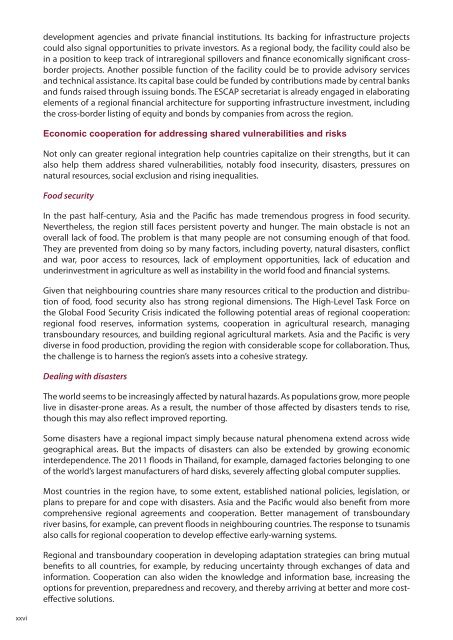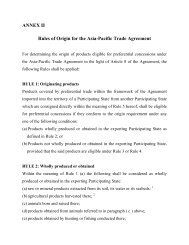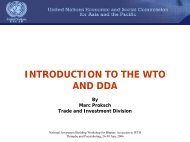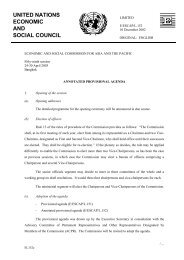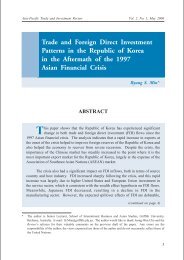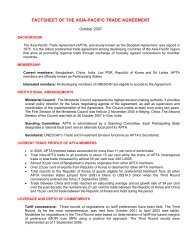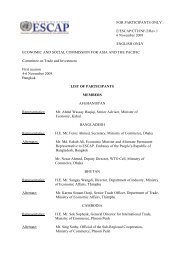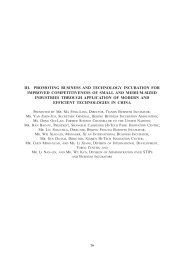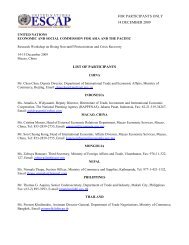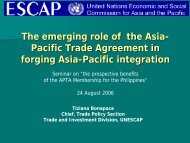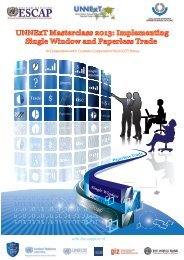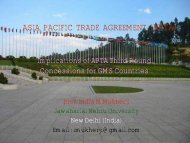Growing Together: Economic Integration for an Inclusive and - escap
Growing Together: Economic Integration for an Inclusive and - escap
Growing Together: Economic Integration for an Inclusive and - escap
You also want an ePaper? Increase the reach of your titles
YUMPU automatically turns print PDFs into web optimized ePapers that Google loves.
xxvi<br />
development agencies <strong>an</strong>d private fin<strong>an</strong>cial institutions. Its backing <strong>for</strong> infrastructure projects<br />
could also signal opportunities to private investors. As a regional body, the facility could also be<br />
in a position to keep track of intraregional spillovers <strong>an</strong>d fin<strong>an</strong>ce economically signific<strong>an</strong>t crossborder<br />
projects. Another possible function of the facility could be to provide advisory services<br />
<strong>an</strong>d technical assist<strong>an</strong>ce. Its capital base could be funded by contributions made by central b<strong>an</strong>ks<br />
<strong>an</strong>d funds raised through issuing bonds. The ESCAP secretariat is already engaged in elaborating<br />
elements of a regional fin<strong>an</strong>cial architecture <strong>for</strong> supporting infrastructure investment, including<br />
the cross-border listing of equity <strong>an</strong>d bonds by comp<strong>an</strong>ies from across the region.<br />
<strong>Economic</strong> cooperation <strong>for</strong> addressing shared vulnerabilities <strong>an</strong>d risks<br />
Not only c<strong>an</strong> greater regional integration help countries capitalize on their strengths, but it c<strong>an</strong><br />
also help them address shared vulnerabilities, notably food insecurity, disasters, pressures on<br />
natural resources, social exclusion <strong>an</strong>d rising inequalities.<br />
Food security<br />
In the past half-century, Asia <strong>an</strong>d the Pacific has made tremendous progress in food security.<br />
Nevertheless, the region still faces persistent poverty <strong>an</strong>d hunger. The main obstacle is not <strong>an</strong><br />
overall lack of food. The problem is that m<strong>an</strong>y people are not consuming enough of that food.<br />
They are prevented from doing so by m<strong>an</strong>y factors, including poverty, natural disasters, conflict<br />
<strong>an</strong>d war, poor access to resources, lack of employment opportunities, lack of education <strong>an</strong>d<br />
underinvestment in agriculture as well as instability in the world food <strong>an</strong>d fin<strong>an</strong>cial systems.<br />
Given that neighbouring countries share m<strong>an</strong>y resources critical to the production <strong>an</strong>d distribution<br />
of food, food security also has strong regional dimensions. The High-Level Task Force on<br />
the Global Food Security Crisis indicated the following potential areas of regional cooperation:<br />
regional food reserves, in<strong>for</strong>mation systems, cooperation in agricultural research, m<strong>an</strong>aging<br />
tr<strong>an</strong>sboundary resources, <strong>an</strong>d building regional agricultural markets. Asia <strong>an</strong>d the Pacific is very<br />
diverse in food production, providing the region with considerable scope <strong>for</strong> collaboration. Thus,<br />
the challenge is to harness the region’s assets into a cohesive strategy.<br />
Dealing with disasters<br />
The world seems to be increasingly affected by natural hazards. As populations grow, more people<br />
live in disaster-prone areas. As a result, the number of those affected by disasters tends to rise,<br />
though this may also reflect improved reporting.<br />
Some disasters have a regional impact simply because natural phenomena extend across wide<br />
geographical areas. But the impacts of disasters c<strong>an</strong> also be extended by growing economic<br />
interdependence. The 2011 floods in Thail<strong>an</strong>d, <strong>for</strong> example, damaged factories belonging to one<br />
of the world’s largest m<strong>an</strong>ufacturers of hard disks, severely affecting global computer supplies.<br />
Most countries in the region have, to some extent, established national policies, legislation, or<br />
pl<strong>an</strong>s to prepare <strong>for</strong> <strong>an</strong>d cope with disasters. Asia <strong>an</strong>d the Pacific would also benefit from more<br />
comprehensive regional agreements <strong>an</strong>d cooperation. Better m<strong>an</strong>agement of tr<strong>an</strong>sboundary<br />
river basins, <strong>for</strong> example, c<strong>an</strong> prevent floods in neighbouring countries. The response to tsunamis<br />
also calls <strong>for</strong> regional cooperation to develop effective early-warning systems.<br />
Regional <strong>an</strong>d tr<strong>an</strong>sboundary cooperation in developing adaptation strategies c<strong>an</strong> bring mutual<br />
benefits to all countries, <strong>for</strong> example, by reducing uncertainty through exch<strong>an</strong>ges of data <strong>an</strong>d<br />
in<strong>for</strong>mation. Cooperation c<strong>an</strong> also widen the knowledge <strong>an</strong>d in<strong>for</strong>mation base, increasing the<br />
options <strong>for</strong> prevention, preparedness <strong>an</strong>d recovery, <strong>an</strong>d thereby arriving at better <strong>an</strong>d more costeffective<br />
solutions.


